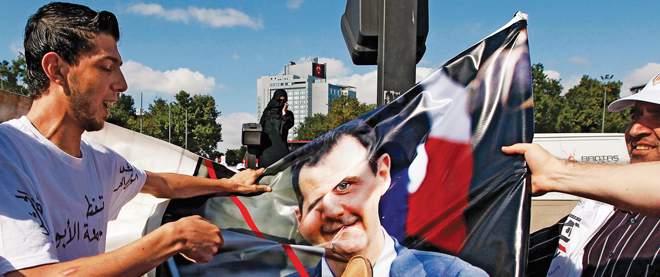Syria’s shifting sands
Will Bashar al-Assad’s brutal crackdown bring down the Syrian regime?
Murad Sezer/Reuters
Share

There is a point at which a regime has committed so much cruelty against its citizens that it will never again have their consent to be ruled. Its choices are then to continue and increase its brutality, or be toppled.
Surely this stage has now been reached in Syria, where President Bashar al-Assad is trying to crush, with force, the anti-government uprising that has taken the country to the brink of civil war.
Protests in Syria began cautiously, with demands for reforms, demonstrations against police brutality and displays of solidarity with protesters in Egypt and Libya. But each time Syrians marched, security forces arrested, beat or shot them. Their defiance grew.
Now, no one talks about reforms, only regime change. Thousands of Syrian soldiers have defected to the rebel “Free Syrian Army,” which has a safe haven in Turkey. Homs, a city close to the Lebanese border where anti-regime sentiment is strong, is regularly lit up at night with tracer fire between rebels and security forces. And President Assad’s Arab League colleagues have turned against him, adding their sanctions to ever-tightening ones imposed by the U.S., the European Union, Turkey and Canada.
“I think he’s finished,” says David Schenker, director of the Washington Institute for Near East Policy’s program on Arab politics. “I don’t know when, how long it’s going to take, or how many innocent Syrians are going to die along the way. But I can’t imagine him surviving this.”
Assad’s most pressing problems are economic, says Schenker. The sanctions are biting. “It takes a lot of money to fuel the tanks and pay people off to kill other people,” he says. Eventually, Assad will run out of money. State institutions, including the army, will falter and break down.
So far, the United Nations estimates at least 4,000 have died. Anti-regime activists say the number is higher, and includes several hundred soldiers killed in clashes with rebel fighters. A recent UN report gives some sense of the scale of the Syrian regime’s response to this uprising: “One military defector decided to defect after witnessing the shooting of a two-year-old girl in Al Ladhiqiyah by an officer who affirmed that he did not want her to grow into a demonstrator.” “Numerous testimonies” suggest that detained boys have been subjected to “sexual torture” in front of adult men. And at least 256 children have died, the report says, citing “reliable sources.”
“Ultimately, he’s going to be toppled. There’s no other choice,” says Houchang Hassan-Yari, a fellow at the Centre for International and Defence Policy at Queen’s University. The regime can only shed the blood of so many “absolutely innocent people,” he says—people who “didn’t really want the end of the regime,” just “very timid” reforms. “With the kind of stubbornness and resolve that we see among Syrians—they’re not going home. They are going to give even more lives to change the system. They are absolutely decided to put an end to their misery.”
Exactly how that end might come about is more difficult to plot. Marina Ottaway, a senior associate in the Middle East Program at the Carnegie Endowment for International Peace, believes the Syrian army will need to fragment much more before the regime is truly threatened.
But Schenker of the Washington Institute says further splits in the army are inevitable. Assad belongs to the Alawite branch of Shia Islam, a minority of about 10 per cent that has prospered under his rule. Some 70 per cent of Syrians are Sunni Muslims, as are most of the protesters. “He’s slaughtering Sunnis by the thousands, and the heart of his army is made up of Sunni Muslims who aren’t going to put up with it,” says Schenker. “You’re going to have increasing numbers of defections. And it’s going to really deteriorate into civil war.”
Several outside actors would have significant stakes in such a war. Syria gives its ally Iran reach into Lebanon through its proxy Hezbollah, a Lebanese militia and terrorist group. Assad’s defeat would be a significant blow to both the Islamic Republic and Hezbollah, which fought a punishing war with Israel in the summer of 2006.
Tehran’s fear of such an eventuality is evident in the way Iranian media report on the uprising. Press TV, an English-language propaganda wing of Iran’s foreign ministry, cites “informed sources” who say French intelligence agencies are supporting “armed groups and terrorists” inside Syria. It has also suggested the U.S. released terrorists from Iraqi jails to join the rebellion.
“If Assad falls, Hezbollah’s strategic depth is finished,” says Michael Young, opinion editor of Beirut’s Daily Star. “Its military power will be neutralized.”
Many in the West would therefore cheer Assad’s demise. It would significantly alter the balance of power in the Middle East and further isolate and weaken Iran. Some protesters inside Syria have asked for outside powers to intervene with military force. But for the time being there is no evidence either NATO or the U.S. is considering doing so. NATO Secretary-General Anders Fogh Rasmussen told reporters in October he had ruled out the option.
Ironically, perhaps, he made the statement during a visit to Tripoli, capital of Libya, shortly after that country’s dictator, Moammar Gadhafi, was overthrown by Libyan rebels backed by NATO air power.